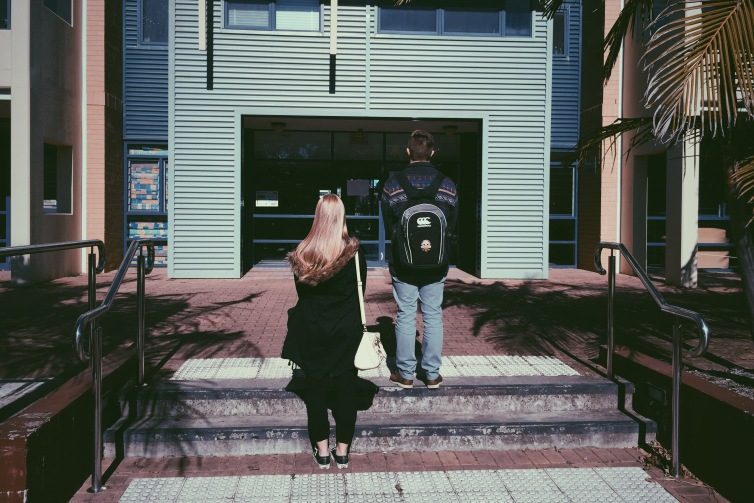
One step ahead.
Take a look around at any journalism lecture in Australia, and chances are you’ll find that female students tend to dominate in numbers. For my Journalism lecture theatre, that statement is true. I chose four ladies from JRNL101 to interview about their aspirations and expectations in journalism as a career, and in return I was given a diverse collection of responses.
“What area of Journalism? Oh travel definitely travel!” Erin King, a student of Communications and Media Studies responded immediately with a bright smile on her face. There was no hesitation in her answer, alongside a clear, keen sense of adventure.
Ciara Garvin, another Media student expressed interested in the avenue of radio. However again, like Erin, I did not need to wait, or prompt a response. “I really love the idea of radio. I spend most of my time in the car driving, so the radio is very important in keeping me sane. I love listening to interesting bits of news as I drive, especially when there is a connection between the hosts and they can bounce off of each other.”
Georgia Cuming, without hesitation responded, “I would love to get into travel journalism, I have loved travelling from a very young age. I’ve been fortunate enough to travel quite a bit. I enjoy experiencing different cultures, and learning new things in different countries – I also love writing so I feel like it would be a good path to go down.
Amy Thompson, pausing for a moment to decide between two choices of career, however deciding to respond with both, “Anything international relations would be amazing. Something that can tie in photography would also be wonderful.”
I interviewed these ladies together, in a group discussion, and what tied each of these four very diverse individuals together for me was their passion to succeed. After spending time with each of these ladies- Erin, Ciara, Georgia and Amy, it became very clear just how driven they are to succeed in what they are passionate about.
Now, take a look around at any journalism lecture in Australia, and chances are you’ll find that female students tend to dominate in numbers. However, in many countries, the majority of high profile journalists and editors tend to be male. Although there have been considerable changes in the prospects for women working in the media in the past few decades, women are still noticeably in the minority in the top journalistic roles, despite making up the majority of journalism students. I posed the question of gender roles within journalism to these women, and whether they thought being a female would affect their career.
“Definitely. As unfortunate as it is, there is still prejudice towards female sports presenters, female interviewers, just that line of work in general. Women are seen as not being able to handle the serious and uglier side of journalism. Some interviewees don’t take them as seriously, either.” Ciara commented, the concern in her voice present. Over the past decade, areas such as conflict reporting and economic journalism have seen far more women take prominent roles.
“There is the fear that you won’t make it, that people will trash whatever you report on, just that you will be rejected by the industry purely for being a woman.” Ciara went on to explain. Erin adding, “You would hope that this day-in-age it wouldn’t, but if we’re going to be realistic, the chances of faces sexism in Journalism are probably pretty high”.
The reality women face in roles of power, specifically in Journalism are still challenged by sexism in the workplace. Newsrooms have typically been a man’s world, and while women are occupying roles as journalists, editors, producers and presenters more than ever before, it’s clear that sexism remains a problem in the industry. Women remained silent for years, fearing a loss of job and/or career if they spoke out about misogyny experienced working in media. Now however, they are finally beginning to speak out, buoyed by the courage and righteous anger of their female colleagues.
The journey ahead for every Journalist, regardless of context, is never going to be easy. It’s how we approach the challenge that matters. Erin, Ciara, Georgia and Amy expressed their keen determination to succeed in their career; the challenges that lay ahead in the competitive path that is Journalism are merely a hurdle to overcome.




